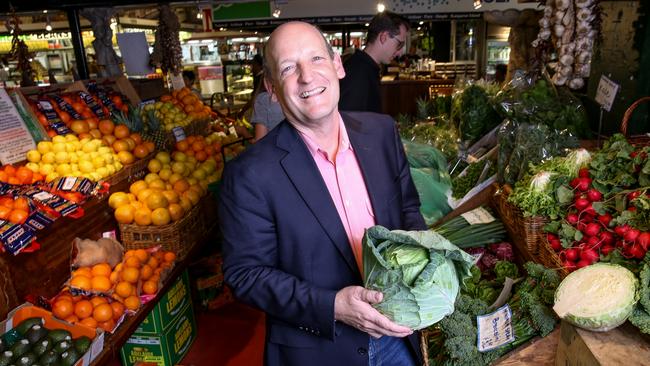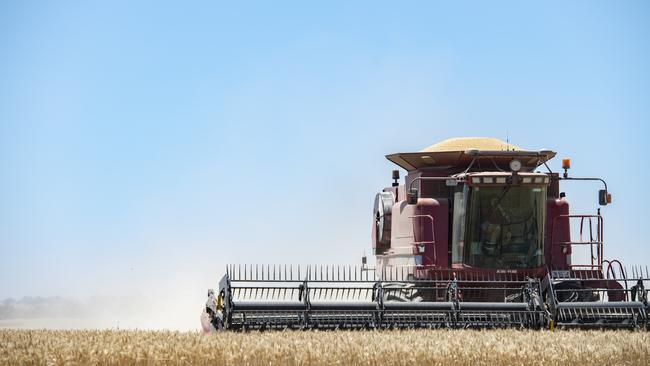Farmers on track to reap rewards in 2022, says Elders CEO Mark Allison
The agriculture sector is set for an upbeat 2022 according to Elders chief executive Mark Allison.

The agriculture sector is set for an upbeat 2022 with strong commodity prices, new international trade agreements and a strong uptake of digital infrastructure in the farm sector, according to Elders chief executive Mark Allison.
In an interview with The Australian, Mr Allison, who is also chair of agricultural industry group Agribusiness Australia, said Australian agriculture was finishing 2021 after one of its strongest years in some time.
He said the industry was now back on track to meet its goal of pre-farm gate agricultural production of $100bn by 2030, after finishing the year with output valued at $78bn.
This represented a significant improvement in previous years, when pre-farm gate production had dropped to a low of $48bn in 2019 in the wake of the prolonged drought on the nation’s east coast.
“Now, with a couple of good seasons, we are back at $78bn and we are back on track to meet the goal set five years ago,” Mr Allison said.
“The industry is finishing the year on a very strong note.
“There is widespread optimism from a profit point and a productivity point of view for next year and going forward.
“There is a lot of money, good soil moisture, a good outlook for the sector and commodity prices are generally strong.’’
Mr Allison said a combination of the positive cashflow from good seasons and the onset of Covid had resulted in farmers stepping up their investment in their digital infrastructure, which was also improving farm productivity.
“Covid has driven the uptake of online activity and digital infrastructure in the industry,” he said.
“The production boom has led to an improvement in digital infrastructure.
“There has been a significant uptake in the adoption of digital activity.”
He said the Covid pandemic had helped to remove some barriers to people using online and digital infrastructure.
Mr Allison said there were a lot of start-ups in the agri-tech sector with good ideas for improving farm productivity, but their adoption had been limited in the past.
But he said Covid was forcing a change in attitudes across the board, with more people being willing to use more digital platforms and technologies.
“Some of those issues (preventing the move to more digital-driven improvements) have been overcome,” he said.
He said there were improvements in online accounting and management systems for farmers, more technology for monitoring water, and drones were now used for cattle and grass monitoring.
“There are multiple combinations which bring it altogether,” he said. “They go to improving productivity, which goes to improving profitability.”
Mr Allison said Covid had also resulted in a significant rise in e-commerce, including in the food and grocery sector.

The Reserve Bank has described the farm sector as “one of the bright spots” in the economy, with farm output rising by more than 40 per cent over the past year and rural exports up by 50 per cent – despite some import restrictions on commodities such as beef and barley by China, Australia’s major trading partner.
Strong commodity prices have also helped to boost farm incomes.
“It is a positive story,” Reserve Bank governor Philip Lowe told a conference earlier this month.
Mr Allison said the outlook for farm exports had also been boosted by the federal government’s move to negotiate free trade agreements with other countries.
“The more agreements, the more opportunities,” he said.
He said the most attractive new deal for agricultural exporters was the Regional Comprehensive Economic Partnership (RCEP), which is due to come into effect on January 1.
The agreement, which was ratified by Australia on November 2, takes in 15 countries, including Australia, New Zealand, Japan, China, South Korea, Thailand, Vietnam, Singapore, and Cambodia.
“It takes in some very critical developed markets including South Korean and Japan,” Mr Allison said.
“It also gives us better access to a growing market of ASEAN countries which have a combined population of some 800 million, all in close proximity, like the China market.”
Mr Allison said China was still a strong market for Australian agricultural products, but he said its increase was limited by a combination of Chinese trade issues such as the ban on accepting meat from five abattoirs in Australia and the high prices of Australian products at the moment compared to those from other countries.
He said Australian agricultural exports to China would continue to increase, but those from other countries such as the US, Canada and from South America would be seeing an increase in market share.
He said investments in Australian agriculture in areas such as the digital traceability of products would help agricultural exports to developed markets in the future.
But he said the agriculture industry was also being affected by supply chain disruptions, including for the import of agricultural equipment and chemicals needed for production.
“Supply chain disruptions globally are having an impact,” he said.
“People are having to wait 12 months to get a new tractor or a harvester.
“There are also issues with inputs such as chemicals and fertilisers.
“There are impacts from Covid around the world which will see input prices increase.”





To join the conversation, please log in. Don't have an account? Register
Join the conversation, you are commenting as Logout